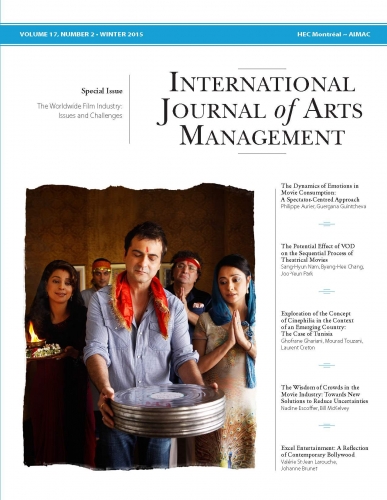Exploration of the Concept of Cinephilia in the Context of an Emerging Country: The Case of Tunisia
Produit: Article
21,00 $ CA
Ghofrane Ghariani, Mourad Touzani, Laurent Creton
Ghofrane Ghariani holds a PhD in information and communication sciences and is a member of the Institut de Recherche sur le Cinéma et l’Audiovisuel (IRCAV) and a lecturer at IUT Paris–Descartes. Her research focuses on cinephilia and contemporary consumption practices in the fields of cinema and audiovisual media as well as on audience behaviour in the field of arts and culture.
Mourad Touzani is an associate professor at NEOMA Business School, where he is also codirector of the MSc program in Marketing French Excellence. He holds a PhD in management science from the Institut d’Administration des Entreprises d’Aix-en-Provence and research supervisor accreditation from the Institut Supérieur de Gestion de Tunis (ISG–University of Tunis). His research focuses on cultural aspects of consumer behaviour, innovativeness, and new forms of communication and distribution.
Laurent Creton is a professor at the University of Paris III: Sorbonne Nouvelle and director of the Institut de Recherche sur le Cinéma et l’Audiovisuel (IRCAV). He specializes in the economics of cinema and audiovisual media and his research focuses on cinema markets, the institutional history of film and business strategies. He has published numerous articles and a dozen books on these topics, including Cinéma et marché (Armand Colin, 1997); Cinéma et stratégies : économie des interdépendances (Presses Sorbonne Nouvelle, 2008); and Économie du cinéma : perspectives stratégiques (Armand Colin, 2009).
ABSTRACT
The meaning of cinephilia, as defined by the children of the French New Wave, is currently undergoing a reexamination. Taking an exploratory, qualitative approach based on a triangulation of data-collection methods, the authors identify the features of contemporary cinephilia in the context of an emerging country, Tunisia, where paradoxical practices of film consumption co-exist. Analysis of the qualitative data suggests three profiles – committed cinephile, neophyte cinephile and neo-cinephile – each described in terms of three dimensions that convey its behaviour with respect to film consumption: cognitive, affective and conative.
KEYWORDS
Cinephiles, audience, film consumption, leisure, triangulation
RÉSUMÉ
Le concept de cinéphilie, tel qu’entendu par les héritiers de la Nouvelle Vague française, subit une remise en question. Par une méthode exploratoire qualitative fondée sur la collecte de données obtenues par triangulation, les auteurs identifient les caractéristiques des cinéphiles contemporains dans le contexte de la Tunisie, pays en émergence où cohabitent des pratiques paradoxales de consommation de films. L’analyse des données qualitatives suppose l’existence de trois profils: les cinéphiles avertis, les cinéphiles néophytes et les néo-cinéphiles. Chacun est décrit en fonction des dimensions cognitive, affective ou conative, lesquelles traduisent le comportement des consommateurs de films.
MOTS CLÉS
Cinéphiles, auditoire, consommation de films, loisirs, triangulation
RESUMEN
El sentido de cinefilia, tal como lo definen los hijos de la Nueva Ola francesa, está actualmente reexaminándose. Los autores adoptan un enfoque exploratorio y cualitativo basado en una triangulación de métodos de recolección de datos para identificar las características de la cinefilia contemporánea en un país emergente, Túnez, donde se observa la coexistencia de prácticas paradójicas de consumo cinematográfico. El análisis de los datos cualitativos indica la presencia de tres perfiles: el cinéfilo comprometido, el neófito y el neocinéfilo. Se describe cada uno en función de tres dimensiones que revelan el comportamiento en relación con el consumo cinematográfico: cognitivo, afectivo y conativo.
PALABRAS CLAVE
Cinéfilos, público, consumo cinematográfico, ocio

